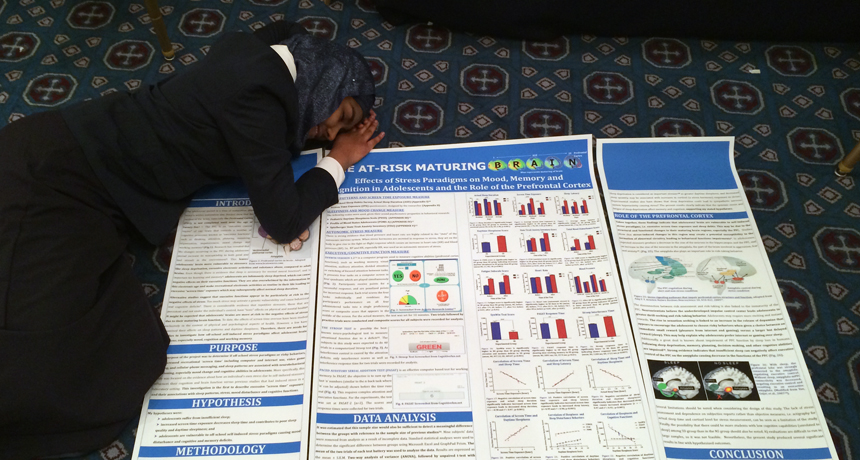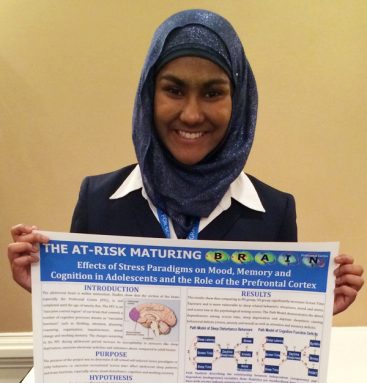Waking up teens about cell phones and sleep
Intel Science Talent Search finalist Zarin Rahman studies how screentime affects sleep

Zarin Rahman models catching some shuteye with her research poster at the 2014 Intel Science Talent Search in Washington, D.C.
B. Brookshire/SSP
WASHINGTON — When imagining a scientist who studies teenagers and sleep, you might first picture someone your parents’ age or older, telling kids to turn off their cell phones late at night so they can get more rest. But now, that message is coming from someone who looks a lot like the typical teenager. Because she is a teenager herself.
Zarin Rahman, 17, became interested in sleep and cell phone use through personal experience. “If I’d been using my phone too much the night before,” she says “I had a hard time focusing in class. I knew there was some kind of connection, there was something that I was doing that was wrong and it was affecting me negatively.” The senior at Brookings High School in Brookings, South Dakota, decided to figure out where she was going wrong, and she began to study the connection between use of electronics and sleep.
Zarin presented her results at the Intel Science Talent Search. Run by the Society for Science & the Public and sponsored by Intel, the annual Science Talent Search brings 40 of the brightest high school seniors to Washington, D.C., for a week of activities, including a chance to show off their science fair projects and compete for hundreds of thousands of dollars in scholarships.

To look at the connection between cell phone use and sleep, Zarin handed out surveys in her high school to a random sampling of 67 13- to 18-year-olds. She asked them how much sleep they got per night, and how much time they spent looking at screens like laptops or cell phones.
Zarin then divided her volunteers into two groups: those who got fewer than eight hours of sleep per night, and those who got a full night’s sleep. Then, before and after school, she ran her participants through a series of tests, assessing their moods, attention span and memory. She also took their blood pressures and measured their heart rates to get a measure of how stressed the volunteers were.
Zarin showed that students who got less sleep were using their electronic devices later into the night than those who were getting a full night’s rest. The participants getting less sleep had higher average heart rates and reported lower moods and higher anxiety. They also performed more poorly on memory and attention tests. Zarin believes that electronic use was keeping her subjects up far later than they intended, and producing negative consequences the next day.
The link she found between more screentime and less sleep led Zarin to change her own behavior. “I stopped using my cell phone until 2 in the morning on Youtube or Netflix,” she says, “and I have to say it’s increased my sleep time, and made me feel better in school.” The teen has shared her findings with the students who participated and with her friends, and says that many of them have reduced their screentime, too. “Being able to share my research with my friends and classmates is not only important to me,” she says, “but also important to them, because they have a better chance of listening to someone who is their age.”
Zarin is looking forward to a career in cognitive science and neuroscience, where she can continue to study and solve problems in people’s lives. She’s off to a good start, and already pointing out one enemy of good sleep habits.
Power Words
cognitive science The study of the mind and how it works. Scientists who study cognition are called cognitive scientists, and can study behavior, brain function or other ways in which the brain controls the way we behave.
neuroscience Science that deals with the structure or function of the brain and other parts of the nervous system. Researchers in this field are known as neuroscientists.
screentime The amount of time that people spend looking at electronic screens, including computer screens, cell phones and televisions.
stress (in biology) A factor, such as unusual temperatures, moisture or pollution, that affects the health of a species or ecosystem. (in physics) Pressure or tension exerted on a material object.